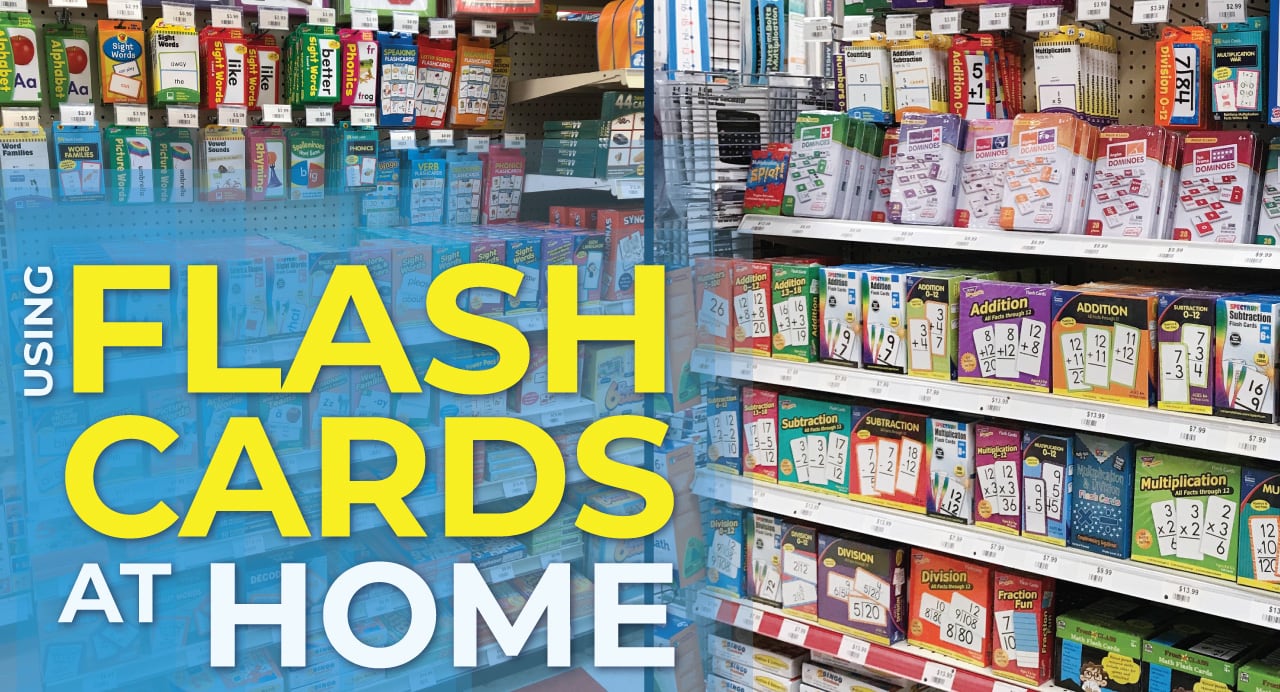
Using Flash Cards at Home
Nothing beats flash cards when you want to help your child master an essential skill. The repetition ensures that learners will be able to recall important skills quickly and accurately.
Here are a few ways to spice things up when you’re using flash cards at home.
Use Repetition, But Not Too Much
Just because the box comes with 100 cards doesn’t mean you need to quiz all 100 cards every day. In fact, your child has probably already mastered some of the cards.
Go through a new box of flash cards with your child. When they answer correctly, place that card back in the box. The remaining cards – which they did not answer correctly – are the cards you need to practice.
Next time you run through the cards, place the cards they get correct in the box, and the ones they missed in another pile. Continue to practice the cards until all the cards have made it into the box.
Every so often, pull out 5-10 cards from the box for review.
Make it a Game
Take the kill out of drill-and-kill by turning it into a game! Build a bridge out of Legos (not too long). The goal is to get a Lego figure across the bridge. Every correct answer is one step forward.

Dice and Flash Cards
Cards and dice; what could be more fun? Give your child 5-10 flash cards. Roll a number, letter, or phonics dice. See how many cards they can find that have that letter, or resolve to that number. For example find all the words with ‘a’ or find all the cards that add up to 6. (For math flash cards, you might want to roll several dice.)

Find the flashcards with the blend rolled on the dice. 
Find the letter on the dice in the flashcards – like playing BINGO.
Break it Down Into Chunks
Ask your child to solve one flash card. If they get it correct, place it on the table. Continue laying down correct cards until you have five cards in a row. Reward them with a sticker, a chocolate chip or raisin, or a two-minute Lego break.
Continue solving the cards making a second row of five, followed by another reward. I f they can get five in a row without mistakes, double the reward.
If they miss an answer, set the card aside. Come back to it later and double the reward for each one they now get correct.

Treasure Hunt
Use a sticky note to mark some of the cards as “treasure” cards. The percentage of cards you mark as treasures will depend on how much motivation your child needs. As you work through the deck, the child collects the treasure cards – if they get the answer correct. Once they’ve accumulated a specific number of treasure cards, they get a reward, or you stop practicing flash cards for that day.

Matching Game
Draw some fun pictures, twice each, on small sticky notes. You’ll need a total of 8 – 12 sticky notes (4 – 6 pairs). Place the sticky notes on the answer side of some flash cards, and place those cards answer side down on the table like a matching game.
Have your child copy the question on the card to a piece of paper and solve the answer or say the word.
Copying information to a piece of paper is a common classroom task, and it prepares students to take notes when they get older. It’s also great handwriting practice.
If they answer the card correctly, the card stays sticky note up. Otherwise turn it back over. The goal is to find matching sticky notes and eventually match all the paired cards. The answer won’t necessarily match. Just the sticky note pictures match. For example the card 4×7 and the card 6×6 might each have a smiley face sticky note. That constitutes a pair.

Independent Practice with Digital Flashcards
Digital flash cards are great for independent practice. Have your child sit nearby while you work and listen for the “right” or “wrong” sound from the machine. If you hear a lot of “oops” beeps, you can make a note to work on that skill when you both have time. If they’re getting most of the questions right, they’re ready to move on.

Practice Math Facts on your own. 
Improve phonemic awareness in a fun way.




